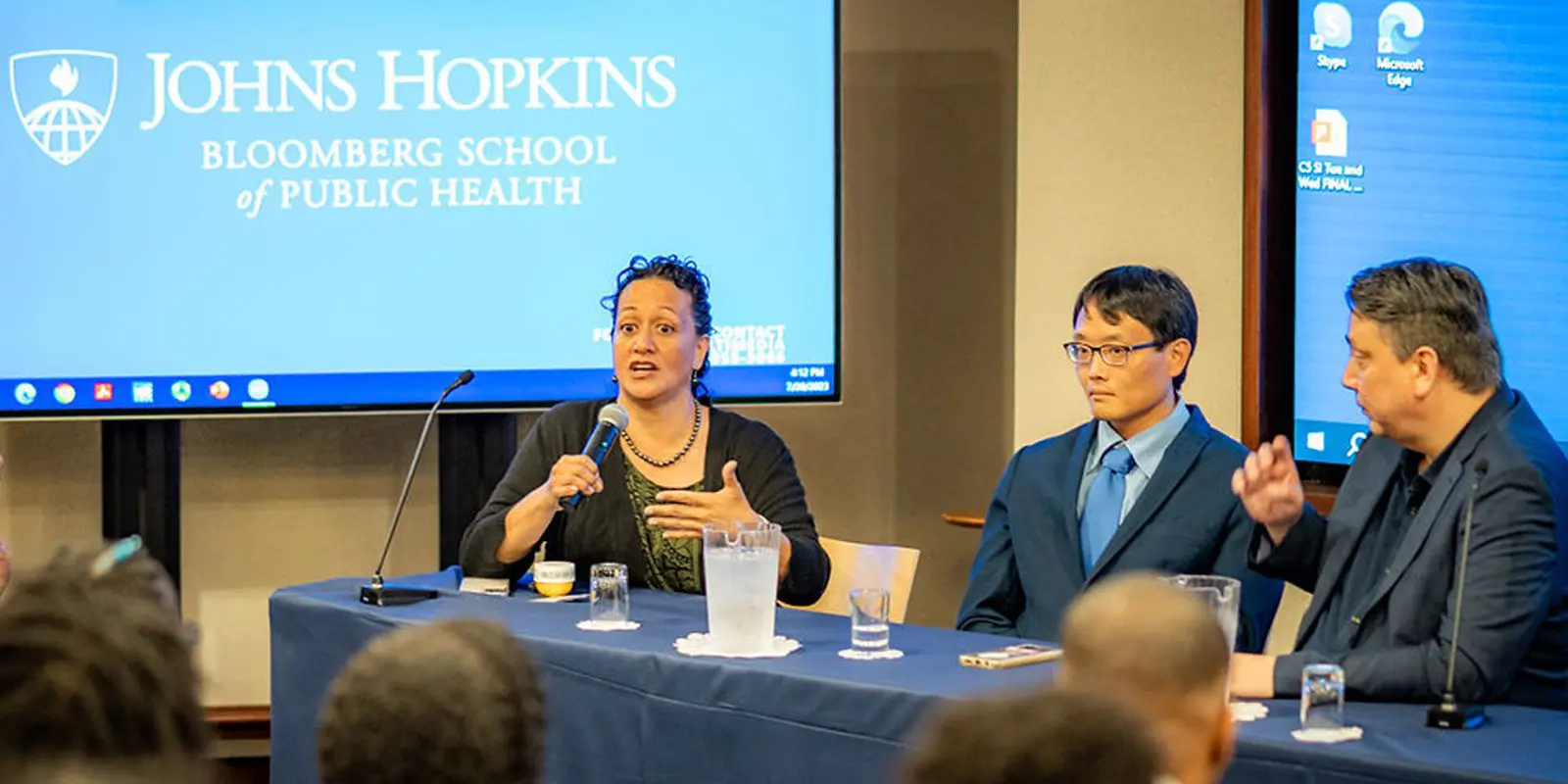When the panel discussion got underway for All Scholar Day at Summer Institute 2023, Cohort 4 scholar Hayden Dawes noticed a shift in the room.
“As the conversation was happening, the energy was starting to take shape,” he recalled. “Everyone started becoming more of a collective.”
The attendees listened attentively, leaning forward, while the panelists discussed their work with communities and coalitions. Snapping fingers started to echo, and murmurs grew across the room as the audience increasingly engaged with the speakers on stage.
It was an auspicious vibe for a conversation about coalition-building.
Titled “Cultivating Collective Action in the Pursuit of a Culture of Health,” the event brought together panelists Alan Dettlaff, a professor at the University of Houston Graduate College of Social Work; Wayne Tanaka, the director of Sierra Club of Hawaii; and Chantelle “Tellie” Matagi, COVID-19 community outreach liaison for Hawaii Department of Health, to engage in a frank, open, and invigorating conversation about the importance of coalition-building in and beyond academia.
Why Coalition-Building?
The topic of coalition-building is especially fitting for HPRS. The program brings together students with unique perspectives, from a range of different disciplines and backgrounds; therefore, coalition-building leverages these perspectives to build toward justice and change.
Hayden co-organized the panel with fellow cohort members Chevelle Davis and Christian Maino Vieytes. Before the three teamed up, he had already experienced the impact and importance of building coalitions. Currently a PhD candidate at the University of North Carolina at Chapel Hill’s School of Social Work, his work promotes the mental health and social wellbeing of LGBTQ+ people of color by improving mental health services, systems, and policies.
“Being a social worker, I think a lot about interconnectedness,” Hayden said, quoting Audre Lorde: “There is no such thing as a single-issue struggle.”
Chevelle, who currently works at Papa Ola Lōkahi, the Native Hawaiian Health board responsible for coordinating and implementing the Native Hawaiian Health Care Improvement Act, also approached the panel-planning process with a deep commitment to coalition-building. “It’s everything,” she said. “Collective organizing across communities is necessary to create the changes we need. We must come together to put pressure on decision-makers to make the changes we want to see in our society.”
Chris, who is currently based at the University of Illinois Urbana-Champaign focusing on food insecurity, works at the intersection of nutrition, epidemiology, statistics, and data science. When explaining his reasons for participating, he noted that his HPRS experience instilled a greater interest in how political and social contexts impact health outcomes, and said that bridge-building was a crucial skill for academics to develop.
A Mini-Coalition Is Born: The Planning Process
Coalition-building was a driving force in the team’s planning process from the start. Each member contributed something unique, with Chris focusing on a collaborative, equitable decision-making process; and Hayden and Chevelle focusing on the selection of speakers.
The support and partnership of the National Program Center (NPC) was also crucial to the planning process. “It felt like a mini-coalition,” Chris said. “Our values and practice were aligned. We had a group process regarding how we should make decisions, using a blind voting procedure that ensured we would not be biased. It was very helpful to have Amanda [from the HPRS staff] there as a liaison as well.”
The team knew that including a diversity of panelists, with different perspectives across fields and sectors, was essential.
“It was important that there was representation in terms of racial identity, location in the country, LGBTQ+ representation, as well as people that may have had disabilities,” Hayden said.
Hayden and Chris also said that Chevelle was instrumental in ensuring that there was representation from people in Hawaiʻi and the Pacific islands, including Tanaka, the director of Hawaiʻi’s Sierra Club, who has done a great deal of coalition-building for environmental issues.
“I hoped that having two panelists from Hawai‘i would bring the people of the Pacific and the issues we face into the discussion,” she said. “I feel like Pacific Islander issues are often invisible in national-level discourse because our population is so small, and most of us live in the most isolated places in the world. And yet we are impacted by the same things people on the continent are, as well as other things unique to our geography and populations.”
Lessons From the Panel
The careful and collaborative planning process led to a meaningful conversation among panelists and scholars.
The panel offered an open exchange around topics relevant to their professional endeavors, such as the tension that can exist between academia and activism; the significance of representation; and the importance of community participation in identifying solutions to local issues.
“This encapsulated the HPRS experience,” Chris said, reflecting on the discussion. “The scholars in our program are passionate people, not afraid to speak and exchange powerful ideas.”
The conversation continues to reverberate today among scholars. Hayden and Chris shared that they received feedback from the NPC that the experience had a lasting impact on many of the scholars, especially the younger ones, with a shift in their demeanor, sense of belonging, and motivation, many feeling more energized and connected to the program.
Hayden said that there were few moments before the panel to come together as an entire HPRS group: “Through the panel, we became a community of scholars who shared the experience of jointly questioning what it takes to create a coalition to bring systemic changes.”
As HPRS welcomed a new cohort last month, Hayden shared a few words of wisdom with the new scholars regarding the value of organizing an event with his HPRS colleagues:
“Pitch it, try it, fail forward,” he said. “There is so much you can learn out of the process of putting an idea forward.”
“It’s been a powerful experience,” Hayden added, “and I’m so grateful to have been a part of it.”

